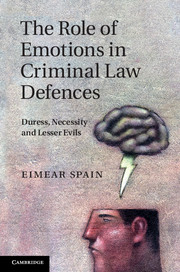6 - A reappraisal
Published online by Cambridge University Press: 07 October 2011
Summary
The failure of the criminal law to engage fully with emotion theory in modern times is to be regretted. Although to some extent there are implicit understandings of emotion evident, it is important for the law to engage with emotions explicitly as they go to fundamental notions of culpability and responsibility. It is clear that key components of these concepts can only be fully understood when the crucial role of emotion in human behaviour is recognised. The preferred view of emotions is the cognitive appraisal theory, an evaluative understanding under which emotions are seen as rational phenomena which provide constructive information on our values and priorities and guide behaviour. In contrast, the mechanistic understanding of emotion sees emotions as physiological urges which are not rooted in rationality and this view has been rejected accordingly. It is clear, therefore, that contrary to commonly held opinion, emotions are not irrational forces which are the antithesis of responsibility. Rather they contribute to responsibility. This study has also highlighted the important role of moral judgment in the criminal law. Moral judgment is vital to criminal law and to this extent there is an important intersection between law and morality. The acceptance of the role of emotion in behaviour does not involve suspending judgment and the fact that an individual has acted while emotional does not negate evaluation.
This prompts the question of how the law governing duress and necessity should be reformulated to take proper account of these concerns. The current distinction between the defences of duress and necessity, the source of the threats, is not a coherent or supportable differentiation. There is no valid reason why the law should treat one who violates the letter of the law due to threats which are human in origin any differently from one who acts due to a desperate situation. It is submitted that the existing defences should be recast in the form of two alternative defences reflecting the different considerations in justification and excuse. The first is a reformulated duress defence, an excusatory defence which largely covers what is currently understood to fall within the ambit of duress, duress of circumstances and parts of necessity. The second defence is a justification-based defence of lesser evils which will exonerate an accused when he or she maximises utility.
- Type
- Chapter
- Information
- The Role of Emotions in Criminal Law DefencesDuress, Necessity and Lesser Evils, pp. 262 - 294Publisher: Cambridge University PressPrint publication year: 2011



